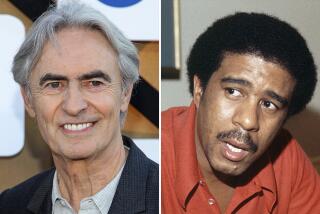Porn Is Part of Our Culture
- Share via
Over the past few weeks, newspapers and television shows have widely reported that college students are hot for porn courses on campus. Whether these reports are accurate or just misleading exaggerations, they do raise a serious question: Why should pornography be studied in an academic setting?
Cultural conservatives and their low-brow counterparts--talk-show hosts--believe porn is not a fit topic for the classroom. They would have us believe that porn is simply videos of people having sex, and hence trivial and the source of nothing more significant than classroom titters.
Right-wing feminists maintain that porn degrades and oppresses women, and that while women appear to be enjoying sex in porn, they are really being raped.
In either case, the attack on porn studies is actually less an attack on the study of sex than it is on the study of popular culture. The conservatives who bemoan the study of porn are the same people who oppose the study of film and popular culture in general.
If they had their way, students would be limited to reading from a “great books” curriculum designed in the 1930s. It would consist of a very narrow list of works written almost exclusively by white men, with a few token women and African Americans added to feign diversity.
But this is nothing more than a dream of returning to a past that never existed anyway. The study of art and literature has always involved attending to both elite and popular forms and genres.
Conservatives can’t close the door on popular culture, for how can we study Shakespeare without studying Shakespeare on film? How can we understand Shakespeare’s reverberation in our culture without examining his appearance in popular media like TV sitcoms, advertisements, films like “Porky’s 2” and, dare I say it, even hard-core pornographic films like “A Midsummer Night’s Cream”?
If Shakespeare appears in a large number of hard-core pornographic adaptations, how can we understand Shakespeare’s afterlives if we don’t also study them?
Also, pornography changes. Porn in 2001 looks very different from porn produced in 1968, which in turn looks very different from porn made in 1928. Therefore, porn, like all other mass-produced elements of popular culture, has a very great deal to say about our society and the cultural dynamics that structure it.
Once it becomes clear that we have to study popular culture as well as elite culture, the conservatives lose, and so they “lose it” in frothing denunciations.
How can we properly study popular culture without studying pornography, the most popular of all genres, the one on which Americans spend an estimated $14 billion a year?
By now, with the expansion of the porn market into suburban homes thanks to the Internet, the VCR and the recent reporting on porn in the mainstream media, enough people have seen porn for themselves to know just how clueless the right-wing feminist critique of porn really is. The politics of pornography are complex, by no means reducible to a simplistic and sexist opposition between evil male oppressors and innocent, vulnerable female victims.
The question is, are we really free to do and say what we want? The numerous women who go into the porn industry to appear in the 10,000 or more porn videos and films made each year obviously do so by choice. And students who elect to take classes on porn, or that include porn, do so by choice.
There is perhaps one thing about which we really have no choice. If we are serious about wanting to understand our culture, then we perforce have to study porn, we have to think about it.
More to Read
The biggest entertainment stories
Get our big stories about Hollywood, film, television, music, arts, culture and more right in your inbox as soon as they publish.
You may occasionally receive promotional content from the Los Angeles Times.










